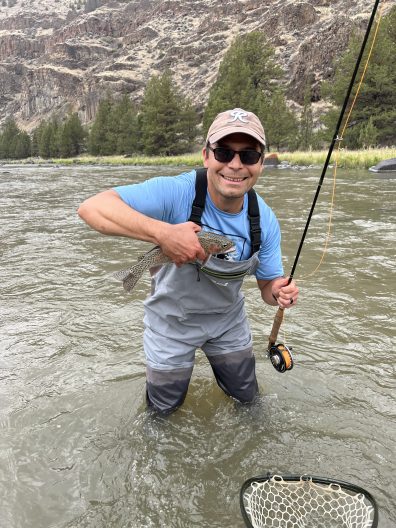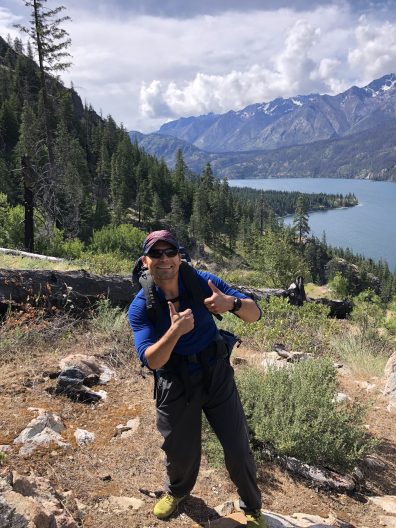 Raised in the small logging town of Aberdeen, Washington, SEFS alumnus Ed Draper was aware of the variable nature of the forest products industry from a young age. “Both my parents told me to not work in the forest products industry given the nature of it, especially when I was growing up,” said Draper. But, as a freshman at UW, he found his way into the industry nonetheless and began a degree that would lead to a long and successful career in paper science. Now, as he joins the Washington Pulp and Paper Foundation as the new executive director, Draper reflects on the opportunities that led him here.
Raised in the small logging town of Aberdeen, Washington, SEFS alumnus Ed Draper was aware of the variable nature of the forest products industry from a young age. “Both my parents told me to not work in the forest products industry given the nature of it, especially when I was growing up,” said Draper. But, as a freshman at UW, he found his way into the industry nonetheless and began a degree that would lead to a long and successful career in paper science. Now, as he joins the Washington Pulp and Paper Foundation as the new executive director, Draper reflects on the opportunities that led him here.
Though he initially was interested in computer science and electrical engineering, a talk with a former professor, Bill Mckean, opened his eyes to the many opportunities in the forest products industry. Draper received a scholarship from the Washington Pulp and Paper Foundation and began to consider the industry during an internship near his hometown at Grays Harbor Paper.
“Seeing the things that we learned about in my freshman year chemistry and math classes, where you could apply some of what you know you’re learning in lecture and see it being done in practice to create something was a great experience. After that, I decided to stay in the paper science major, and I’m very glad that I did,” said Draper.
Draper went on to graduate with a master’s in paper science engineering in 2003 and worked his way through a variety of roles in the paper and pulp industry over 15 years. From engineer to regional quality manager for the western US at global packaging company Sonoco, Draper learned the workings of the industry and built relationships with customers like Kimberly-Clark, Procter & Gamble, and Philip Morris. Eventually, Draper returned to Sonoco’s mill in Sumner, Washington, as senior process engineer in charge of working on large capital projects, before taking over as the production superintendent for the mill, where he managed day-to-day operations.
After reconnecting with Mark Lewis, who formerly managed the paper science lab at UW, Draper was recruited for a company creating sustainable alternatives using nonwood material and agriculture waste like wheat straw, sugar cane, and barley. With a process using less chemicals and less energy, they produced a sustainable wood pulp replacement for all sorts of paper products.
 Now, Draper returns to UW with a wealth of knowledge about the pulp and paper industry. As the newly appointed executive director of the Washington Pulp and Paper Foundation, he is looking forward to the opportunity to work with students again and provide guidance on the program he navigated 25 years ago. As he adjusts to the role, he anticipates finding opportunities to expand on how the foundation aligns with the Bioresource Science and Engineering (BSE) major.
Now, Draper returns to UW with a wealth of knowledge about the pulp and paper industry. As the newly appointed executive director of the Washington Pulp and Paper Foundation, he is looking forward to the opportunity to work with students again and provide guidance on the program he navigated 25 years ago. As he adjusts to the role, he anticipates finding opportunities to expand on how the foundation aligns with the Bioresource Science and Engineering (BSE) major.
“Traditionally, we’ve recruited the traditional companies that supply the pulp and paper industry. But the BSE program is not just pulp and paper. It’s bioresources. There’s a big sustainability aspect of this major, and I’m hoping to look at how we can bring in other companies that are interested in sustainability, especially in the packaging area, and convince them to join the foundation and recruit students who come out of this program,” said Draper.
Draper is an avid outdoor enthusiast, enjoying everything the Pacific Northwest has to offer with his wife and two daughters. His advice for students today? Get hands-on experience, through an internship or program, that can help determine whether you like working in an industry and explore what type of role best suits you.



![Sam, at work here in the paper lab, cites the small class sizes and accessibility of professors as huge reasons for her success. “Renata [Bura] is such a mom,” she says. “She’s fantastic.”](http://depts.washington.edu/sefsblog/wordpress/wp-content/uploads/2016/06/2016_06_Mendez2.jpg)

